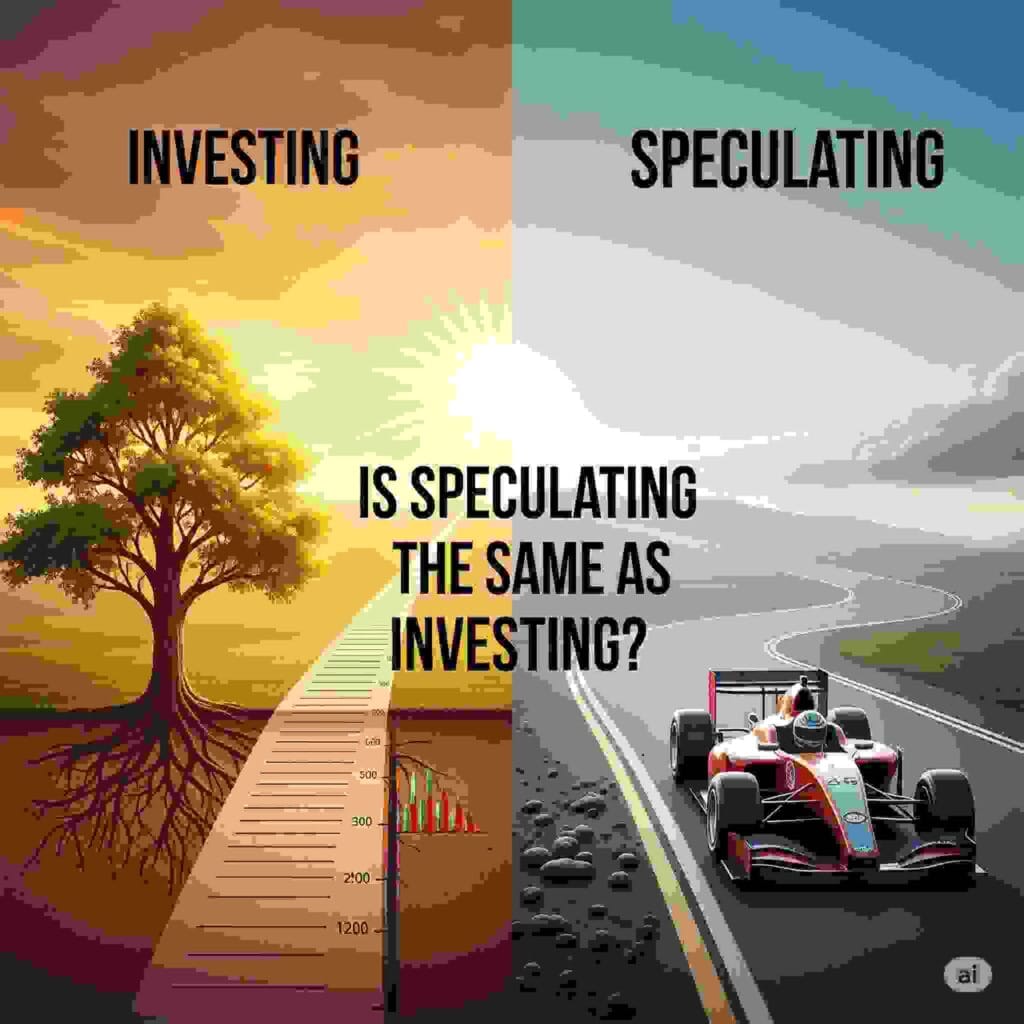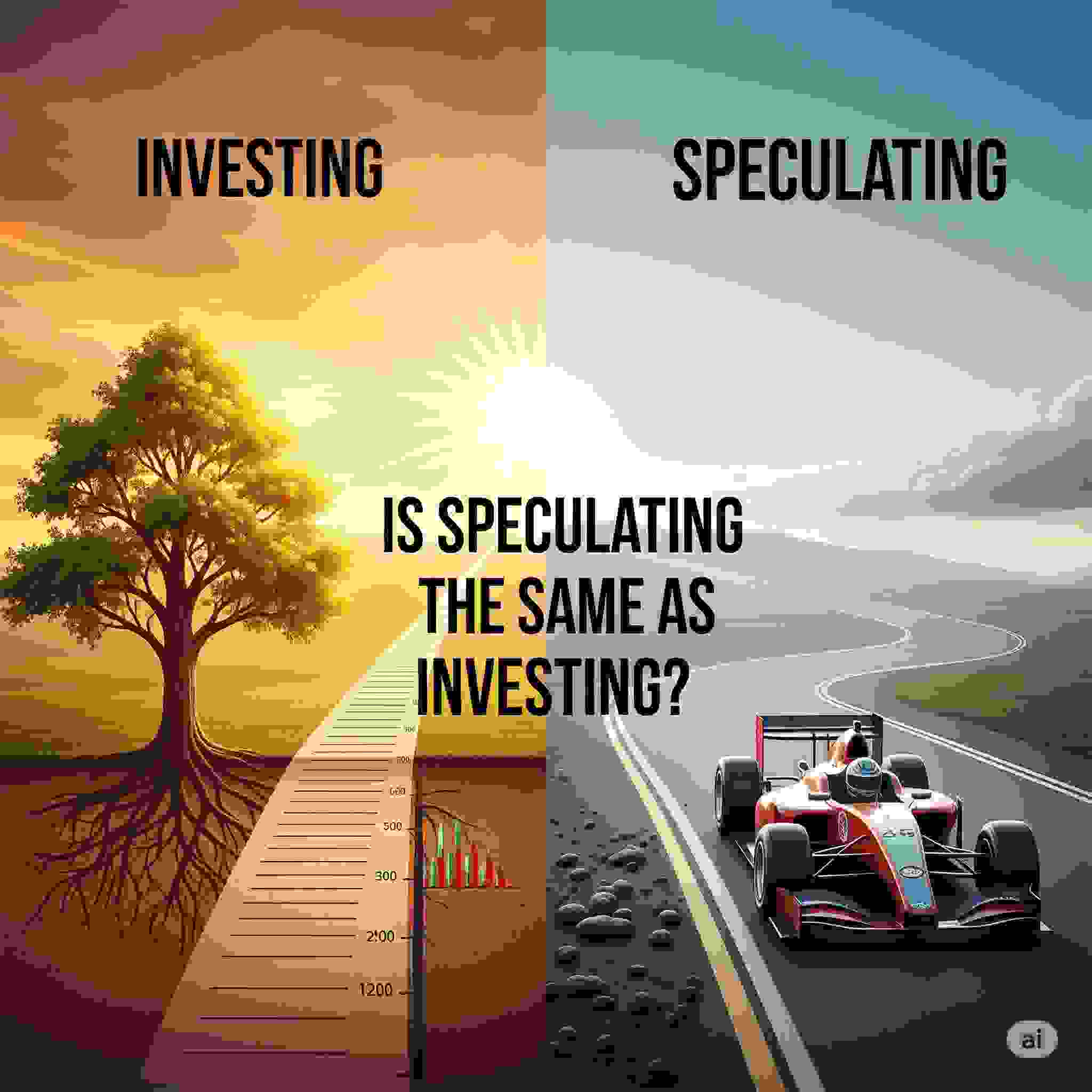Is speculating the same as investing? Learn the key differences, risks, and benefits of each approach to make informed financial decisions. Explore our in-depth guide now! #Is Speculating the Same as Investing, #difference between investing and speculating, #speculating vs investing explained, #speculating vs investing, #speculating vs investing risks

Introduction
Is speculating the same as investing? When navigating the financial world, this question frequently confounds both inexperienced and seasoned persons. Although they both entail investing in markets in order to increase wealth, their strategies, risks, and results are quite different. Knowing if speculating and investing are the same thing is essential to making sure your financial choices support your objectives, whether they are to explore high-stakes chances or save steadily for retirement. We examine the definitions, risks, advantages, and useful tactics of the seven main distinctions between investing and speculating in this extensive book. By the conclusion, you’ll understand how to make the best financial decisions.
Understanding Investing: Building Wealth Over Time
Allocating cash to assets such as stocks, bonds, mutual funds, or real estate with the hope of earning long-term returns is known as investing. Is speculating the same as investing? No—investing emphasizes stability, research, and gradual wealth accumulation.
Defining Characteristics of Investing:
- Long-Term Horizon: With an emphasis on steady growth, investors retain assets for years or decades. For instance, making contributions to an IRA or 401(k) is a traditional long-term plan.
- Research-Driven Decisions: Core factors like a company’s profitability, debt-to-equity ratio, or market trends serve as the foundation for investments.
- Risk Mitigation: Exposure to market volatility is decreased via diversification across asset classes (such as index funds and exchange-traded funds, or ETFs).
- Examples include investing in a Vanguard S&P 500 ETF or purchasing stock in well-known corporations like Apple.
Investing is like planting a tree now to get the benefits of its shade years from now. For example, compounding might increase a $10,000 investment in an S&P 500 index fund at a 7% annual return to almost $76,000 in 30 years.
Understanding Speculating: Chasing Quick Profits
Speculating is placing high-risk wagers on assets in the hopes of making substantial, quick profits. Is speculating the same as investing? Not at all—speculating, which depends on ephemeral price changes and market mood, is more akin to gambling.
Defining Characteristics of Speculating:
- Short-Term Focus: In order to profit from price fluctuations, speculators exchange assets within days, hours, or even minutes.
- High Volatility: Assets that are subject to sharp swings include options, penny stocks, and cryptocurrency.
- Trend-Based Decisions: Rather than using fundamental analysis, traders frequently base their decisions on social media trends, technical indicators, or market hype.
- Examples include trading futures contracts, purchasing meme coins like Dogecoin, and day trading erratic equities.
Both huge riches and tragic losses can result from speculation. A speculator purchasing a popular cryptocurrency, for instance, could lose all of their money in a market crash or double it in a week.
Is Speculating the Same as Investing? 7 Essential Differences
Is speculating the same as investing? To clarify, let’s explore seven critical differences that set these approaches apart:
Time Horizon
- Investing: Investing is centred on long-term growth, which typically lasts between five and thirty years. A diversified retirement portfolio is one way that investors strive for consistent growth.
- Speculating: Aims for quick profits, frequently in the form of days or weeks. An impending earnings announcement may influence speculators’ stock trading decisions.
- Example: A speculator trades cryptocurrency during a price spike, whereas an investor purchases a bond fund for ten years.
Risk Profile
- Investing: Reduce risk by holding a variety of reliable assets. Bonds and stocks in a well-balanced portfolio can withstand market downturns.
- Speculating: Risky because of erratic assets. For example, in 2021, Bitcoin fell 50% in a single month, which had a significant effect on speculators.
- Example: It is safer to invest in a well-known company like Coca-Cola than to speculate on a startup’s initial public offering.
Decision-Making Approach
Investing: Depends on in-depth investigation and the analysis of economic indicators or price-to-earnings ratios.
Speculating: Usually with little to no fundamental research, this activity is motivated by technical charts, market mood, or social media buzz.
Example: A speculator tracks a trendy topic on X, while an investor examines a company’s financials.
Expected Returns
- Investing: Provides steady, moderate profits (7–10% yearly for stocks, for example).
- Speculating: Offers the possibility of large profits but also substantial loses.
- Example: A speculative options trade may triple or disappear in a matter of days, but an ETF rises consistently over years.
Emotional Involvement
- Investing: Less daily oversight is needed, which lowers stress and emotional decision-making.
- Speculating: Requires continuous attention and frequently results in rash purchases or panic selling.
- Example: Speculators examine prices hourly, whereas investors analyse portfolios every three months.
Liquidity Needs
- Investing: Usually focusses on long-term gains and involves less liquid assets, such as retirement funds or real estate.
- Speculating: Concentrates on highly liquid assets, such as equities or cryptocurrency, for rapid trades.
- Example: A speculator uses a broking app to trade liquid assets, whereas an investor places money in a 401(k).
Goal Orientation
- Investing: Strives for financial stability by paying for things like a child’s education or retirement.
- Speculating: Seeking rapid wealth, frequently motivated by excitement or opportunity.
- Example: Saving for college by investing in a mutual fund as opposed to making quick money by speculating on a trendy stock.
Is speculating the same as investing? These seven distinctions show that speculating seeks high-risk, immediate gains, whereas investing prioritises stability and growth.
Speculating vs Investing: Risks in Detail
Is speculating the same as investing when it comes to risks? No—speculating is inherently riskier. Here’s a deeper look:
Speculating Risks
- Market Volatility: Speculative investments have the potential to fall sharply. For instance, a Dogecoin meltdown in 2021 resulted in 40% losses in a few of days.
- Lack of Fundamentals: Speculative wagers sometimes rely on hype or momentum rather than long-term value.
- Emotional Decisions: Out of fear or greed, traders may sell during downturns, locking in losses.
- Leverage Risks: Losses can be increased by using borrowed money (for example, in margin trading).
Investing Risks
- Market Volatility: Although a rebound is inevitable, diversified portfolios may experience declines during recessions. The S&P 500, for example, bounced back after the 2008 catastrophe in a matter of years.
- Inflation Risk: If assets are poorly selected, returns might not exceed inflation.
- Opportunity Cost: Limiting flexibility may result from tying up money in long-term investments.
Is speculating the same as investing in risk management? Through study and diversification, investing provides greater control, whereas speculating exposes you to a great deal of unpredictability.
Benefits of Investing Over Speculating
Is speculating the same as investing for wealth-building? Investing provides more reliable advantages:
- Consistent Growth: Index funds and other diversified portfolios provide consistent returns. Over decades, the S&P 500 has averaged 10% yearly.
- Passive Income: Continuous cash flow is produced by bond interest or equity dividends.
- Compounding Effect: Compounding is how long-term investing optimises wealth. In 20 years, a $5,000 investment rises to $21,700 at an annual rate of 8%.
- Reduced Stress: Investing allows for a hands-off approach because it requires less daily supervision.
- Tax Benefits: Compared to short-term speculative trades, long-term investments sometimes qualify for lower capital gains taxes.
Investing is the best option for long-term prosperity because of its stability, even though speculation may yield fast gains.
When Might Speculating Be Appropriate?
Is speculating the same as investing for everyone? No, but speculating can suit specific scenarios:
- High Risk Tolerance: Speculating could be worthwhile if you can afford to lose your investment.
- Portfolio Diversification: For possible high returns, allocate 5–10% of your portfolio to risky assets.
- Market expertise: Speculating can be profitable for experienced traders who possess technical analysis or market timing abilities.
- Short-Term Goals: If successful, speculation can be used to finance short-term goals like a trip.
But you should never let speculation take precedence over the stability of your investment approach.
How to Choose Between Speculating and Investing
Is speculating the same as investing for your financial plan? To decide, evaluate these factors:
- Financial Objectives: Are you looking for long-term stability, like retirement? Decide to invest. Seeking rapid financial gain? Think about restricted speculation.
- Tolerance for Risk: Are you able to bear losing all of your money? Otherwise, continue investing.
- Time Commitment: While investing requires little upkeep, speculating necessitates continuous market observation.
- Knowledge Level: While investing requires rudimentary research, speculating necessitates a deeper comprehension of the market.
- Financial Situation: Before you speculate, make sure you have a steady investment portfolio and an emergency reserve.
Is speculating the same as investing in practice? For most, investing’s predictability outweighs speculating’s volatility.
Conclusion
Is speculating the same as investing? They both deal with financial markets, but they are very different in terms of goals, liquidity, emotional engagement, risk, decision-making, rewards, and time horizon. According to the seven key distinctions listed above, investing creates money via patience and research, whereas speculating aims for high-risk, quick gains. The majority of people find that investing is a safer and more dependable way to achieve financial security, but for those with experience and a low tolerance for risk, speculation may have a place. Make informed decisions by evaluating your objectives, risk tolerance, and available funds, giving top priority to a strong investing base.
FAQs about Is Speculating the Same as Investing?
Q1: Is speculating the same as investing?
No, investing focusses on steady, long-term growth, whereas speculating entails high-risk, short-term wagers.
Q2: What are the main risks of speculating?
High volatility, a lack of fundamentals, rash judgements, and the possibility of large losses are all hazards associated with speculation.
Q3: Can I combine speculating and investing?
Yes, you should preserve the majority of your portfolio in diversified investments and devote 5–10% to speculation.
Q4: Which is better for beginners?
Long-term stability, easier research, and reduced risk make investing superior.
Q5: How do I start investing safely?
Start with diversified assets like as index funds, look at the fundamentals of the companies, and speak with a financial counsellor.
Q6: Does speculating affect my credit score?
Your ability to handle debt may be impacted by losses, but speculating has no direct effect on your credit score.
Disclaimer
This article is not financial advice; rather, it is merely informational. A licensed financial advisor should always be consulted before making any speculative or investing decisions. There are risks associated with all financial operations, and past success is not a reliable predictor of future outcomes.
Also Read:

